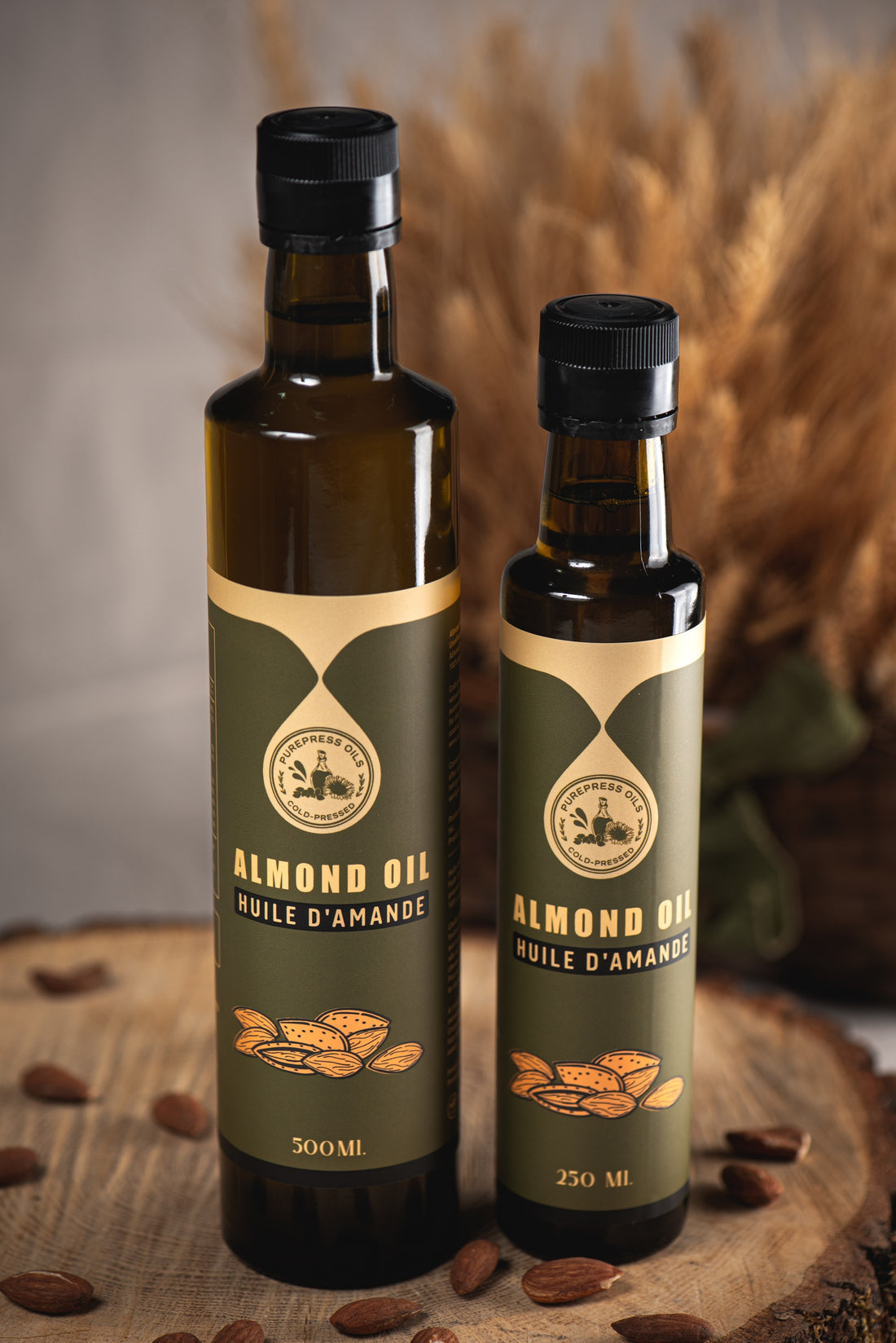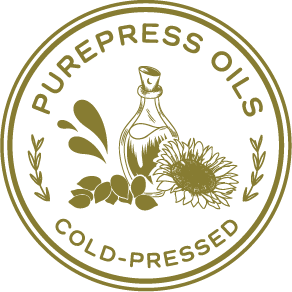
The Versatility of Cold-Pressed Almond Oil: A Natural Solution for Cooking, Skin, and Hair Care
Olesya OdasShare
At Purepress Oils, we take great pride in producing the finest cold-pressed oils. While our cold-pressed pumpkin seed oil is widely loved, there’s another oil that has captivated the hearts of health enthusiasts, chefs, and beauty gurus alike—almond oil.
Cold-pressed almond oil is one of nature’s most versatile oils. Its gentle flavor makes it a favorite in the kitchen, while its nutrient-rich profile offers excellent benefits for skin and hair. In this blog post, we’ll explore how almond oil for cooking, almond oil for skin, and almond oil for hair can enhance your lifestyle. We’ll also take a closer look at the process of creating cold-pressed almond oil and why this method preserves its natural goodness.
Whether you’re looking for an oil to enhance your favorite recipes or nourish your body from the outside, almond oil might be the all-natural solution you’ve been searching for.
What Is Almond Oil?
Almond oil is derived from sweet almonds, primarily Prunus amygdalus var. dulcis. These nuts are cold-pressed to extract the oil, preserving all of the nutrients found in raw almonds. The resulting oil is light gold in color and has a mild, sweet flavor that complements both culinary and beauty applications.
There are two main types of almond oil:
- Cold-Pressed Almond Oil: Extracted without the use of heat or chemicals, cold-pressed almond oil retains all of the beneficial nutrients found in the almond.
- Refined Almond Oil: This is processed using heat or solvents, which can strip the oil of some nutrients and alter its taste and smell.
At Purepress Oils, we produce cold-pressed almond oil, which is the most nutrient-dense version of this versatile oil.
Almond Oil for Cooking: Flavor Meets Nutrition
Almond oil has gained popularity in kitchens worldwide, thanks to its mild, nutty flavor and impressive health benefits. Cold-pressed almond oil is packed with healthy fats, vitamins, and antioxidants, making it a nutritious addition to a variety of dishes.
Nutritional Benefits of Almond Oil for Cooking
Almond oil is rich in monounsaturated fats—the same heart-healthy fats found in olive oil. According to research, monounsaturated fats can help reduce LDL (bad) cholesterol and lower the risk of heart disease when consumed as part of a balanced diet (Gillingham et al., 2011).
In addition to healthy fats, almond oil contains:
- Vitamin E: This powerful antioxidant helps protect your cells from oxidative stress. Vitamin E is known for its anti-inflammatory properties and is crucial for skin health and immune function (Brigelius-Flohé & Traber, 1999).
- Polyphenols: Cold-pressed almond oil retains a number of polyphenolic compounds, which contribute to its antioxidant and anti-inflammatory effects.
- Oleic Acid: A type of monounsaturated fat that can support cardiovascular health and reduce inflammation.
How to Use Almond Oil in Cooking
Almond oil for cooking is incredibly versatile. Its subtle, sweet flavor makes it perfect for a variety of dishes, from salad dressings to baked goods. However, due to its relatively low smoke point (around 420°F or 216°C), almond oil is best used in low- to medium-heat cooking or as a finishing oil.
Here are some delicious ways to incorporate cold-pressed almond oil into your diet:
- Salad Dressings: Blend almond oil with lemon juice or vinegar for a light, refreshing dressing. Its mild flavor pairs well with leafy greens, fruits, and nuts.
- Drizzling Oil: Use almond oil as a finishing touch for roasted vegetables or soups. Its nutty flavor enhances the natural taste of the ingredients without overpowering them.
- Baking: Substitute almond oil for butter or vegetable oil in recipes for a heart-healthy alternative. It works well in cakes, muffins, and cookies, adding a subtle nuttiness to your baked goods.
- Sautéing: While almond oil has a lower smoke point than some other oils, it can still be used for sautéing vegetables or cooking at medium heat.
Note: While almond oil is excellent for light cooking, it’s not ideal for high-heat frying. The heat can break down the oil’s delicate nutrients, so it’s best to use it in ways that preserve its health benefits.
Almond Oil for Skin: A Nourishing, Natural Moisturizer
One of the most popular uses for almond oil outside the kitchen is in skincare. Cold-pressed almond oil is lightweight, non-comedogenic (meaning it won’t clog pores), and packed with skin-nourishing vitamins and fatty acids.
Why Use Almond Oil for Skin?
-
Moisturizing: Almond oil is rich in vitamin E, which helps lock in moisture and keep the skin hydrated. This makes it an excellent choice for dry or sensitive skin types. The oil also contains essential fatty acids that strengthen the skin’s barrier and prevent moisture loss.
-
Soothing Inflammation: Thanks to its anti-inflammatory properties, almond oil can soothe irritated or inflamed skin. It’s often used to help manage conditions like eczema and psoriasis (Kang et al., 2011).
-
Anti-Aging Benefits: Almond oil is loaded with antioxidants like vitamin E, which help neutralize free radicals and reduce the signs of aging. Regular use of almond oil can improve skin elasticity, reducing the appearance of fine lines and wrinkles.
How to Use Almond Oil for Skin
- Facial Moisturizer: Apply a few drops of cold-pressed almond oil to your face after cleansing, focusing on areas that tend to be dry. The oil absorbs quickly, leaving your skin soft and hydrated.
- Makeup Remover: Almond oil makes an excellent natural makeup remover. Apply a small amount to a cotton pad and gently wipe away makeup, even waterproof mascara, without irritating the skin.
- Body Oil: For all-over hydration, apply almond oil to your body after a shower while your skin is still damp. This helps lock in moisture and leaves your skin feeling silky smooth.
- Soothing Sunburn: If you’ve spent too much time in the sun, almond oil can help calm sunburned skin. The oil’s anti-inflammatory properties provide relief while its vitamin E content helps repair damaged skin.
Almond Oil for Hair: Strengthen and Shine
Cold-pressed almond oil is also a favorite in hair care routines due to its ability to nourish the scalp and strengthen hair strands. If you’re looking for a natural way to improve hair health, almond oil for hair may be the solution.
Benefits of Almond Oil for Hair
- Moisturizes the Scalp: Almond oil’s high concentration of essential fatty acids helps moisturize and balance the scalp. This is particularly helpful for those with dry or flaky scalps.
- Strengthens Hair Strands: The vitamin E and antioxidants found in almond oil help strengthen hair from the roots, reducing breakage and promoting healthier, shinier hair.
- Promotes Hair Growth: While more research is needed, some studies suggest that the high concentration of nutrients in almond oil, particularly magnesium, may help support hair growth and reduce hair thinning (Ravichandran et al., 2019).
How to Use Almond Oil for Hair
- Scalp Treatment: Warm a small amount of almond oil and gently massage it into your scalp. Leave it on for 30 minutes or overnight before washing it out with a gentle shampoo. This helps moisturize the scalp and promote healthy hair growth.
- Conditioner Booster: Add a few drops of almond oil to your regular conditioner to boost its hydrating properties. This works particularly well for dry or damaged hair.
- Split-End Treatment: Rub a small amount of almond oil onto the ends of your hair to help prevent and treat split ends.
Cold-Pressed vs. Refined Almond Oil: Why Cold-Pressing Matters
Cold-pressing is the process of extracting oil without the use of heat or chemicals. This method ensures that the oil retains its full range of nutrients, including vitamins, antioxidants, and healthy fats. Cold-pressed almond oil is considered superior to refined versions because it hasn’t been subjected to high temperatures that degrade the oil’s nutritional profile.
At Purepress Oils, we believe in the power of nature. That’s why we use traditional cold-pressing methods to create a product that’s as pure and potent as possible. Our small-batch production ensures that every bottle of cold-pressed almond oil is made with care and craftsmanship.
Medical Claims Disclaimer
While almond oil offers a wide array of benefits for cooking, skin, and hair care, it is important to note that we do not make any claims that our products can cure, treat, or prevent medical conditions. The information provided in this blog is intended for educational purposes and should not replace professional medical advice.
Conclusion
Cold-pressed almond oil is a versatile, nutrient-rich oil that offers benefits for your kitchen, your skin, and your hair. From adding a nutty flavor to your favorite recipes to moisturizing dry skin or strengthening hair, almond oil can easily become a staple in your daily routine.
At Purepress Oils, we take pride in producing high-quality cold-pressed almond oil that’s made with care and tradition. Whether you’re a culinary enthusiast, a beauty lover, or someone who values natural health products, almond oil has something to offer. Visit our online shop today and discover the magic of cold-pressed almond oil
References:
Gillingham, L. G., Harris-Janz, S., & Jones, P. J. H. (2011). Dietary monounsaturated fatty acids are protective against metabolic syndrome and cardiovascular disease risk factors. The Journal of Nutrition, 141(5), 869-874.
- This study explores the positive effects of monounsaturated fats, such as those found in almond oil, on cardiovascular health.
Brigelius-Flohé, R., & Traber, M. G. (1999). Vitamin E: function and metabolism. FASEB Journal, 13(10), 1145-1155.
- This research explains the role of vitamin E as an antioxidant, highlighting its importance for skin health and overall well-being.
Kang, S., Cho, S., Chung, J. H., & Hammerberg, C. (2011). Anti-inflammatory effects of vitamin E in human skin. Journal of Investigative Dermatology, 131(2), 391-399.
- This paper outlines how vitamin E, which is found in almond oil, can help reduce skin inflammation and soothe conditions like eczema and psoriasis.
Ravichandran, R., Ramalingam, K., & Senthilvelan, T. (2019). Role of magnesium in hair loss and treatment: a review. Journal of Chemical and Pharmaceutical Research, 11(1), 1-6.
- This review discusses the potential benefits of magnesium, a mineral present in almond oil, for promoting hair growth and reducing hair thinning.
